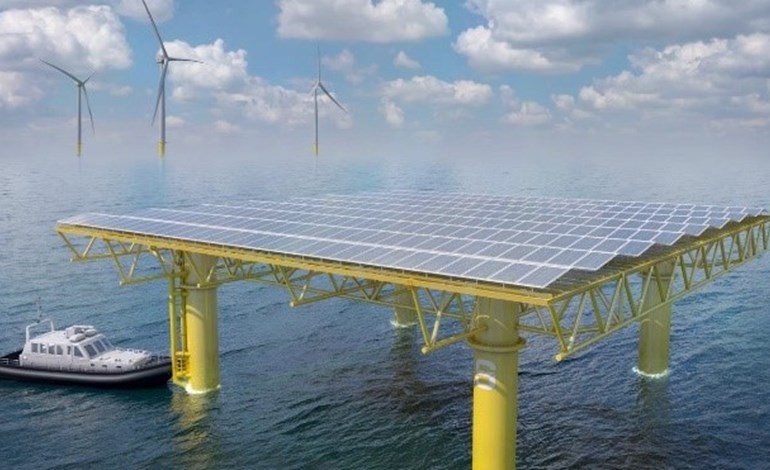SeaVolt, a collaboration between Tractebel, DEME, and Jan De Nul, is preparing to install its first floating solar energy test platform offshore. The platform flotation system is currently located in the Port of Ostend, on the Belgian North Sea coast, where main contractor Equans is finalising assembly. The test platform will be the first installation in the Belgian North Sea aimed at the large-scale development of offshore solar energy and is scheduled to be towed offshore, anchored, and put into operation to gather data for at least a year starting in August. Unlike existing floating solar installations on lakes, SeaVolt has developed a concept specifically tailored to the conditions of rough seas, the consortium said.
With its modular design, this technology is highly suitable for installation as a complement to offshore wind farms. Under the framework of the Blue Cluster funded research project MPVAQUA and additional support from the federal government via BELSPO, the partners within SeaVolt together with Ghent University (UGENT) are ready to conduct a year-round open-sea testing inside the POM-West Vlaanderen owned ‘Blue Accelerator offshore test zone’. This proof of concept installation will gather crucial data on the impact of waves, rain and salt sprays on various solar panels with different PV panel configurations. In addition, the impact of varying inclinations, caused by waves and wind, on the energy output will be closely monitored. The test aims to determine the level of protection required to shield the solar panels from seawater and bird droppings, the consortium said. Amongst other materials suitable for this floating technology, SeaVolt has chosen to use novel light-weight carbon fiber material in this test installation. This material presents potential benefits for offshore use however is not often used in such harsh marine conditions yet, according to the developers. Optical embedded fibers and sensors attached to the structure will assess if the structural integrity (vibrations/fatigue) of the material is in line with the numerical models and results obtained from the ocean wave tank and wind tunnel tests. Since the floating structure and solar panels are driving the cost, these measurements are indispensable for further financial assessment. In addition to technical tests, the SeaVolt test installation will also address ecological aspects. Various materials will be evaluated based on prevention of adverse effects on the marine environment. The test results will determine the selection of materials for further development. It is important not only to minimize the attachment of excessive marine growth to the floater to maintain its buoyancy, the developers said. Lastly, specific tests will be conducted to assess combining the floater systems with mussel cultivation and oyster farming, which present specific challenges
Credits: renews.biz [Image: Jan De Nul]

